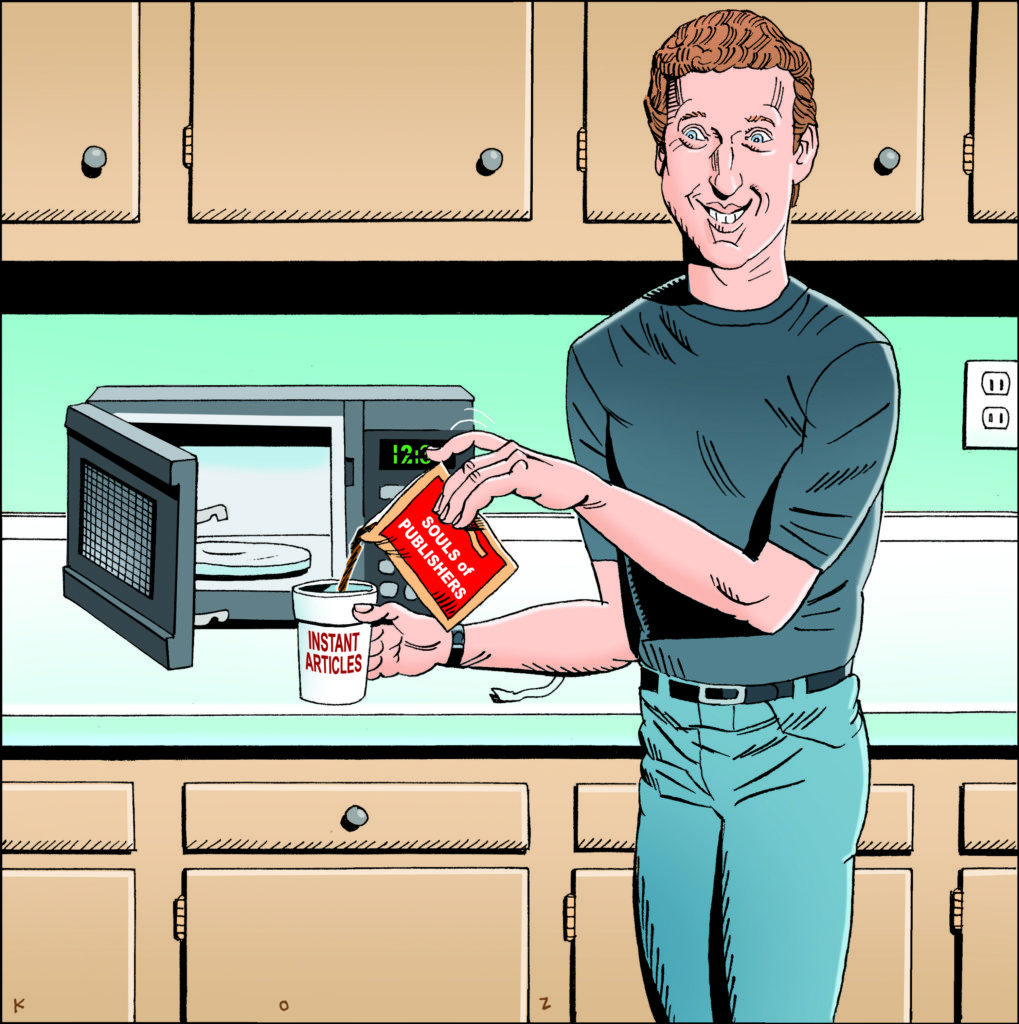Brands
Contently Comic: Facebook Instant Articles
In tech, there’s a popular turn of phrase called “dogfooding it.” At first, I thought this was just something we say whenever our VP of content, Sam Slaughter, tries to convince our edit team to eat a dog treat. As it turns out, it means using your own product.
Mark Zuckerberg does that on Facebook sometimes, such as holding Town Hall Q&As similar to Reddit’s “Ask Me Anything.” Here’s an answer he gave to Stephen Hawking, for example:

That’s some evil genius stuff right there. If Facebook solves the underlying formula of human relationships, it’s time to bow down and simply accept our social media overlords. Honestly, the answer sent a chill down my moderately Luddite spine—but that wasn’t the first time I’d found Zuckerberg and Facebook frightening.
It would be hard to find anyone in the media world who’d deny that Zuckerberg and Co. wield a disturbing amount of power. A quick read of The Atlantic‘s perfectly titled “Facebook Is Eating the Internet” piece from April will tell you why.
A couple of key quotes from the article (the first one is drawn from Pew’s annual “State of the Media” report):
- “Facebook is getting a quarter of all display ad revenue and more than a third (37 percent) of display ads on mobile.”
- “Vox, for instance, gets 40 percent of visits through the site. Other leading news organizations get something like a quarter of site visits from Facebook, according to Nieman Journalism Lab.”
- And a third one, for good measure, from Marketing Land: “Facebook accounted for 75 percent of social ad spend globally spend in 2014.”
Taken together, it’s easy to see that Facebook owns the media and marketing world—and its power only seems to be growing.
Perhaps Facebook’s biggest announcement this year—and the most explicit signal of its dominance—was its unveiling of Instant Articles, a platform that allows publishers to post their articles directly on Facebook’s mobile-optimized app. Journalists and media analysts freaked out that premiere publications like The New York Times and the Guardian were jumping at the chance to give Facebook their content for free—ourselves included. A simple Google search of “Facebook Faustian Bargain” will give you a pretty good idea of how most news outlets responded to the announcement.
The freakout turned out to be a bit premature, as the Instant Articles program still hasn’t really gotten started. Since the initial wave of Instant Articles the day the feature was rolled out, only a single Guardian article has been posted (though reports claim The New York Times and others are planning to post 30+ a day as soon as last week).
When it does get started for real, get ready for a new flood of hot takes declaring the death of publishers’ autonomy. And they’ll have a point—there are many unanswered business and ethical questions surrounding the initiative that may not be answered until the experiment is in full swing. Will the partnership affect partnering media companies’ willingness to publish negative Facebook articles? Will publishers have as much access to their readership data as before? And, as I questioned when the announcement first broke, will publishers ever escape Facebook’s walls once they’re in?
In other words, what happens to publishers’ souls when Facebook isn’t just the gatekeeper, but also owns all the land? Maybe I’ll ask Zuck in his next Q&A.
Image by Martin KozlowskiGet better at your job right now.
Read our monthly newsletter to master content marketing. It’s made for marketers, creators, and everyone in between.





